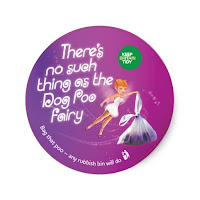 I talk about poo a lot. Whether it's about the regularity or consistency of movements, toilet training or encouraging people to be responsible and pick up after their dog, poo is certainly something that comes up in the majority of my consults. By far the most common questions from puppy owners are about poo...
I talk about poo a lot. Whether it's about the regularity or consistency of movements, toilet training or encouraging people to be responsible and pick up after their dog, poo is certainly something that comes up in the majority of my consults. By far the most common questions from puppy owners are about poo..."Why does he eat his own poo?"
"Why does he eat cat poo"
"How can I stop him eating his own poo"
"He follows my other dog and eats his poo"
"How can I stop him licking me after he's eaten poo"
....you get the idea.
My advice was always simple and followed the same lines as with any unwanted behaviour. The key is to prevent your dog from practicing the behaviour and reward them lavishly for an alternative behaviour that is incompatible with the original one. However, having lived through this issue first hand, I wanted to share my experiences of working through coprophagia (useful new word for the pub quiz!) and turning it from a 'problem' into a useful activity.
My little pup Gru is now a year old and has a fantastic skill. He can tell me exactly where there is some dog poo that hasn't been picked up. Not only does this come in handy in the garden (there's always one you miss!), it's even more useful at our 3 acre field. Pin pointing poo hasn't always been a skill for Mr Gru as his preferred option used to be to gobble it down as soon as he found it.
So how exactly did I transform Gru from a poo-eater to a poo-hunter?
Step 1 - When I first noticed Gru tucking into a 'snack' aged 12 weeks my instinct was to shout "Leave, no, ah ah" or a similar command that meant "don't eat that" but would likely have no effect on Gru's behaviour what so ever. I also felt the need to walk towards him and move him away or try to pick up the poo before he could eat it all. However, I had my behaviourist hat on that day and so instead of doing any of the above I did something very simple. I stood still and said nothing.
Step 2 - Now I knew my little pup had a taste for no. 2's, I stepped up the supervision in the garden and made sure the garden was poo-free. I kept Gru on a lead or long line for toilet trips initially and was armed with tasty treats. As soon as he went to the toilet I would celebrate . . "Yes! Good boy!" which would inevitably get his attention and he would trot over to me to see what all the fuss was about. I would keep celebrating and give him a few tasty treats as we walked back into the house. Once he was inside, I would return outside on my own to pick up the poo.
Step 3 - After a few weeks Gru was coming back to me on the patio after going to the toilet. He was expectant of the celebration and reward so I relaxed a bit and didn't worry about the lead or line when out on toilet trips. This extra 'freedom' gave Gru the opportunity to sniff poo at which point I would celebrate and he'd come to me for a reward.
Step 4 - A year down the line he's now a very reliable poo hunter. I can even tell when he's on the scent as he gets very excited and his tail wags in a particular way. Now when he finds his prize, he'll stand over it, give it a good sniff and then look back to me to make sure I've noticed. A "Yes, good boy" brings him running over for his reward which I'm only assuming tastes better than poo!
So there you have it, from poo eater to poo hunter in a matter of months with very little effort. I knew Gru was on a good diet (which is often the reason given as to why dogs are eating poo) and didn't want to use an aversive to make his poo taste nasty (again commonly given advice) so I decided to go with it and turn it into a useful, fun activity. Remember, how you react to your dogs' behaviour will have a dramatic effect on whether that behaviour continues or diminishes so before you take a step towards your dog and say "ahah" just think about whether it's a major issue at all. Sometimes doing or saying nothing is the best way to react.
Have fun!







